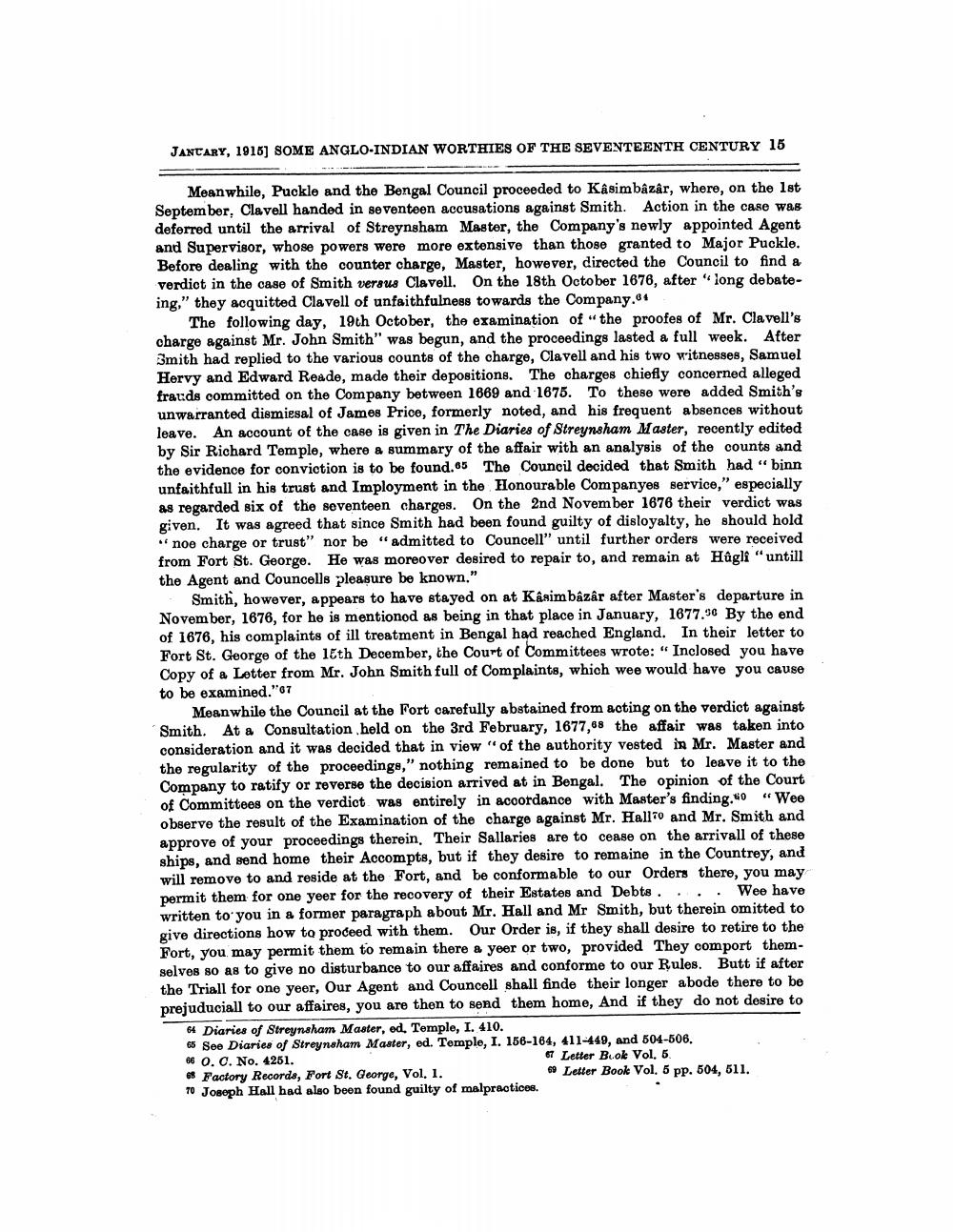________________
JANUARY, 1916) SOME ANGLO-INDIAN WORTHIES OF THE SEVENTEENTH CENTURY 15
Meanwhile, Puckle and the Bengal Council proceeded to Kasimbâzâr, where, on the 1st September, Clavell handed in seventeen accusations against Smith. Action in the case was deferred until the arrival of Streynsham Master, the Company's newly appointed Agent and Supervisor, whose powers were more extensive than those granted to Major Puckle. Before dealing with the counter charge, Master, however, directed the Council to find a verdict in the case of Smith versus Clavell. On the 18th October 1676, after long debateing," they acquitted Clavell of unfaithfulness towards the Company.c1
The following day, 19th October, the examination of the proofes of Mr. Clavell's charge against Mr. John Smith" was begun, and the proceedings lasted a full week. After Žmith had replied to the various counts of the charge, Clavell and his two witnesses, Samuel Hervy and Edward Reade, made their depositions. The charges chiefly concerned alleged frauds committed on the Company between 1669 and 1675. To these were added Smith's unwarranted dismiesal of James Price, formerly noted, and his frequent absences without leave. An account of the case is given in The Diaries of Streynsham Master, recently edited by Sir Richard Temple, where a summary of the affair with an analysis of the counts and the evidence for conviction is to be found.65 The Council decided that Smith had "binn unfaithfull in his trust and Imployment in the Honourable Companyes service," especially as regarded six of the seventeen charges. On the 2nd November 1676 their verdict was given. It was agreed that since Smith had been found guilty of disloyalty, he should hold "noe charge or trust" nor be "admitted to Councell" until further orders were received from Fort St. George. He was moreover desired to repair to, and remain at Hûgli "untill the Agent and Councells pleasure be known."
Smith, however, appears to have stayed on at Kasim bâzâr after Master's departure in November, 1676, for he is mentionod as being in that place in January, 1677.90 By the end of 1676, his complaints of ill treatment in Bengal had reached England. In their letter to Fort St. George of the 10th December, the Court of Committees wrote: “Inclosed you have Copy of a Letter from Mr. John Smith full of Complaints, which wee would have you cause to be examined."07
Meanwhile the Council at the Fort carefully abstained from acting on the verdict against Smith. At a Consultation held on the 3rd February, 1677,68 the affair was taken into consideration and it was decided that in view of the authority vested in Mr. Master and the regularity of the proceedings," nothing remained to be done but to leave it to the Company to ratify or reverse the decision arrived at in Bengal. The opinion of the Court of Committees on the verdict was entirely in accordance with Master's finding to "Wee observe the result of the Examination of the charge against Mr. Hallio and Mr. Smith and approve of your proceedings therein. Their Sallaries are to cease on the arrivall of these ships, and send home their Accompts, but if they desire to remaine in the Countrey, and will remove to and reside at the Fort, and be conformable to our Orders there, you may permit them for one yeer for the recovery of their Estates and Debts.... Wee have written to you in a former paragraph about Mr. Hall and Mr Smith, but therein omitted to give directions how to prodeed with them. Our Order is, if they shall desire to retire to the Fort, you may permit them to remain there a yeer or two, provided They comport themselves so as to give no disturbance to our affaires and conforme to our Rules. Butt if after the Triall for one yeer, Our Agent and Councell shall finde their longer abode there to be prejuduciall to our affaires, you are then to send them home, And if they do not desire to
64 Diaries of Streynsham Master, ed. Temple, I. 410. 65 See Diaries of Streynsham Master, ed. Temple, I. 156-164, 411-449, and 504-506. 66 0. C. No. 4251.
67 Letter Blok Vol. 5. 66 Factory Records, Fort St. George, Vol. 1.
69 Letter Book Vol. 5 pp. 504,511. 70 Joseph Hall had also been found guilty of malpractices.




